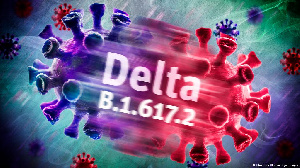 The WHO has classified the Delta variant as a
The WHO has classified the Delta variant as a
• The WHO has classified the Delta variant as a “Variant of Concern”
• The declaration means the variant has shown to be more contagious, more deadly or more resistant to current vaccines and treatment
• The Ghana Health Service has, however, shot down claims that the AstraZeneca vaccine administered in the country is ineffective against the delta variant
Ghana’s Presidential Advisor on Health, Dr Anthony Nsiah Asare in a recent interview confirmed detection of the Indian variant of the deadly COVID-19 in the country.
The World Health Organization has categorized the Delta Variant of COVID-19 as a “variant of concern.” This means that the variant has shown to be more contagious, more deadly or more resistant to current vaccines and treatment.
Prior to the emergence of the delta variant, the Alpha variant was the most contagious variant of the COVID-19 virus which originally emerged from Wuhan, China, in December 2019.
Current data suggests that the Delta variant which has spread from India to over 90 countries is about 60% more transmissible than the alpha variant.
Even though more research needs to be conducted into the delta variant, some reports indicate that the Indian variant of the virus causes more sickness in infected persons and is more likely to cause death.
Vaccination
Ghana since March 2021 commenced a nationwide vaccination exercise that aims at having its adult population vaccinated against the COVID-19 virus by the end of the year.
Out of an estimated population of over 30 million, about 800,000 individuals have received jabs against the virus.
The number is made up of 852,042 persons who have received a single dose of the Oxford AstraZeneca vaccine while some 380,829 have received the full double dosage of the vaccine.
Despite Ghana certifying the Russian made Sputnik V vaccine for use in the country, the vaccine is yet to be administered to citizens owing to procurement constraints.
With only a tiny fraction of the population fully vaccinated and the detection of the deadly Indian Delta COVID-19 variant in the country, some persons have raised concerns over what could become another wave of infections that threatens to be more serious than ever.
Amidst the concerns, some people have also pointed out that the AstraZeneca and the Sputnik V vaccines approved for use in the country have a minimal effect against the Delta variant of COVID-19.
Such concerns have been raised by the Head of the West Africa Center for Cell Biology and Infectious Pathogens at the University of Ghana, Professor Gordon Awendare.
“Now we have to be looking at the right vaccines. All this while, we’ve been fixed on AstraZeneca and Sputnik V but we have to shift towards more of Pfizer and others which have a better chance of protecting against this variant. Because the future is, we are going towards these aggressive variants,” he told Joy Prime on Monday, June 12, 2021.
However, responding to concerns about the efficacy of the AstraZeneca and Sputnik V vaccines against Delta, the Director-General of the Ghana Health Service, Dr Patrick Kuma Aboagye has described the assertions as untrue.
Dr Patrick Kuma-Aboagye in a GHS statement copied to GhanaWeb indicated that the claims were not backed by data.
“According to Public Health England (PHE), two doses of the Oxford-AstraZeneca vaccine are highly effective against hospitalization due to the Delta variant and showed no deaths among those vaccinated.
A study conducted by Gamaleya Centre suggests that Sputnik-V is more efficient against the Delta variant of coronavirus first detected in India, compared to other COVID-19 vaccines,” the statement read in parts.
The statement further statement noted that data available to the GHS “suggest that the AstraZeneca vaccine is effective against symptomatic disease caused by the Delta variant.”
“In the midst of global supply shortages, the MOH and GHS are diligently working with Government to ensure that adequate vaccines are procured to protect the population. The MOH, GHS and the Food and Drugs Authority (FDA) are working collaboratively to ensure that vaccines that come into the country are safe and effective,” the GHS urged.